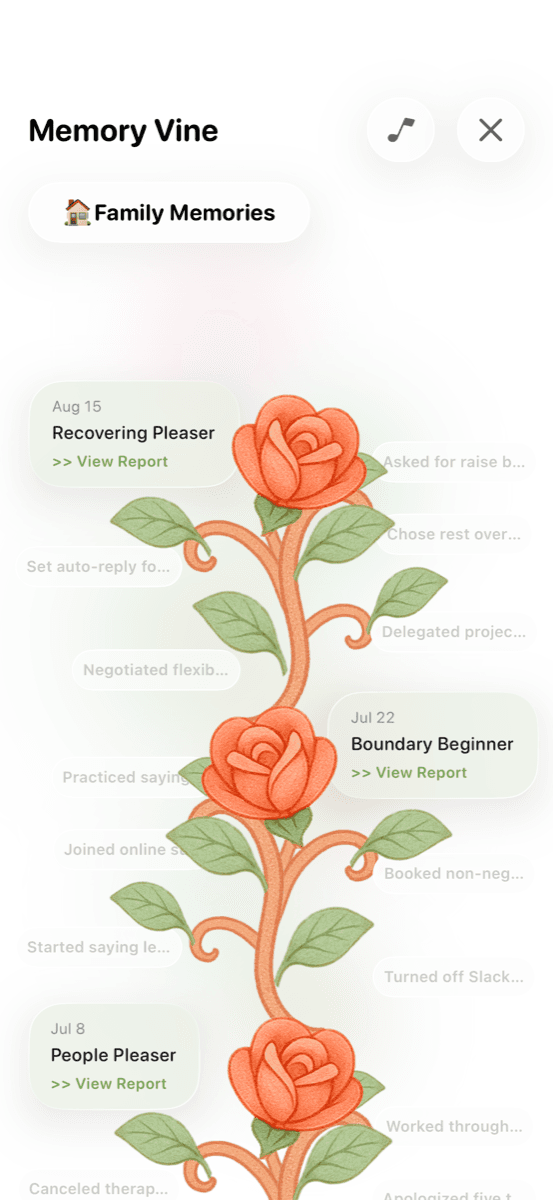It's 3 AM. You've been studying for 11 hours straight. Your vision is blurry. You've had three energy drinks and skipped two meals. Tomorrow's exam is worth 35% of your grade.
Your roommate went to bed at midnight after studying for 4 hours. She seems fine. Meanwhile, you're on the verge of a panic attack, and you still have 200 pages to review.
Your parents keep asking about your GPA. Your scholarship requires a 3.5. Pre-med programs want a 3.7+. Your professor said "only 15% of students get A's." You can't afford to be in the other 85%.
When did "do your best" turn into "destroy yourself"?
Here's what nobody tells you: The academic pressure that drives you to succeed is the same pressure that's destroying your mental health—and eventually, your actual performance.
This guide covers how to recognize when academic pressure becomes toxic, how to set healthy boundaries with your education, and how to recover when you're already burned out.
The Academic Pressure Paradox
The more you need good grades, the harder it becomes to get them:
High stakes = high anxiety = impaired performance:
- Anxiety floods your brain with cortisol
- Cortisol impairs memory, focus, decision-making
- Working memory capacity drops by 30-50% under extreme stress
- You study more but retain less
- Anxiety during exams prevents you from accessing information you know
Sleep deprivation compounds the problem:
- All-nighters impair learning by 40%
- Sleep is when memory consolidates—no sleep = information doesn't stick
- Each hour of sleep lost = 10% drop in cognitive performance next day
Result: The harder you push, the worse you perform. But you can't stop pushing because the stakes are too high.
Where Academic Pressure Comes From
1. External Pressures
Parents:
- "We're paying $60,000/year—you better get good grades"
- Conditional love/approval based on performance
- Comparison to siblings/cousins
- "We sacrificed everything for your education"
Institutional:
- Scholarship GPA requirements
- Grad school/med school/law school admissions (3.7+ expected)
- Grade curves (someone has to fail for others to get A's)
- Internship/job applications asking for transcripts
Social:
- Everyone shares their A's on social media (never their C's)
- Comparison culture: "What did you get?"
- Identity based on being "the smart one"
2. Internal Pressures (Often Worse)
- Perfectionism: "Anything less than A is failure"
- Self-worth tied to achievement: "If I fail this exam, I'm worthless"
- Fear of disappointing people: "I can't let them down"
- Imposter syndrome: "I only got in because of a mistake—I have to prove I deserve to be here"
- All-or-nothing thinking: "If I can't be the best, there's no point"
When Academic Pressure Becomes Toxic
Healthy academic motivation:
- Striving for excellence while accepting imperfection
- Studying hard but also prioritizing sleep, social life, health
- Disappointment in bad grade, but resilience to move forward
- Self-worth exists independent of academic performance
Toxic academic pressure:
- Sacrificing sleep, health, relationships for grades
- Panic attacks before/during exams
- Suicidal thoughts when grades drop
- Physical symptoms (chest pain, nausea, headaches) from academic stress
- Cheating because failure feels intolerable
- Self-worth completely dependent on GPA
The line: When pursuit of academic success is actively destroying your wellbeing, it's crossed into toxic territory.
The Academic Burnout Cycle
- High expectations: Need perfect grades for [scholarship/parents/grad school/self-worth]
- Overwork: Study constantly, sacrifice sleep/health/social life
- Diminishing returns: Exhaustion makes studying less effective
- Anxiety increases: "I'm working so hard but my grades aren't improving"
- More overwork: "I just need to work harder"
- Burnout: Complete exhaustion, can't study even when you try, depression, apathy
- Grades drop: Burnout impairs performance
- Panic: "I'm failing—I need to work even harder"
- Cycle intensifies
Breaking point: Mental health crisis, medical withdrawal, or complete academic collapse
Setting Healthy Academic Boundaries
1. The GPA Reality Check
Questions to ask yourself:
- "What GPA do I actually need vs. what do I think I need?"
- Scholarship requirement: 3.0? 3.5? (Not 4.0)
- Grad school minimum: 3.0-3.5 for most programs (not 4.0)
- Job applications: Most don't ask for GPA after first job
- "Am I chasing perfection or excellence?"
- Perfection = unattainable, anxiety-driven, never good enough
- Excellence = doing your best within healthy limits
- "What am I sacrificing for this grade?"
- If answer is "my mental health, sleep, and wellbeing"—recalibrate
2. The 80/20 Rule for Studying
Pareto Principle applied to academics:
- 80% of your exam score comes from 20% of the material
- Focus on high-yield material (professor emphasis, practice problems, key concepts)
- Diminishing returns after certain point—studying hour 8 is far less effective than hour 1
Strategy:
- Identify the 20% (what professor emphasized, past exams, study guides)
- Master that thoroughly
- Stop when you hit diminishing returns (for most people: 6-7 hours/day max)
3. Non-Negotiable Boundaries
Protect these at all costs:
- Sleep: 7-8 hours minimum (all-nighters are net negative for performance)
- Meals: 3 per day (brain needs glucose to function)
- Exercise: 30 minutes most days (reduces cortisol, improves focus)
- Social connection: At least weekly (isolation worsens mental health → worsens performance)
- One full day off per week: Brain needs rest to consolidate learning
"But I don't have time for that!"
If you can't maintain these basics, you're already in burnout territory. These aren't luxuries—they're requirements for sustainable performance.
4. The Strategic B
Concept: Not every class deserves equal effort
Prioritize based on:
- Major requirements: Core classes for your field deserve more effort
- Your strengths: Lean into what you're good at
- What interests you: Passion drives better performance with less effort
Accept strategic B's in:
- Gen ed requirements outside your interest
- Classes where you're genuinely struggling despite effort
- When pursuing A would require sacrificing mental health
Reality: A 3.5 GPA with good mental health > 4.0 GPA with burnout and depression
When to Choose Wellbeing Over GPA
Choose mental health when:
- You're having suicidal thoughts related to grades
- You're experiencing panic attacks before/during exams
- You haven't slept more than 4 hours/night for a week
- You're engaging in self-harm as punishment for bad grades
- Academic stress is causing physical health problems
- You're too anxious/depressed to study effectively
Options:
- Medical withdrawal: Drop class without W on transcript if documented mental health reason
- Incomplete grade: Finish coursework later when mental health stabilizes
- Reduced course load: Take 3 classes instead of 5
- Leave of absence: Take semester off to address mental health
Important: Your life is more important than any grade. If academic pressure is making you suicidal, drop the class. Withdraw from the semester. Take time off. You can always retake a class. You can't retake your life.
Academic Accommodations for Mental Health
What you can get with documentation:
- Extended deadlines for assignments
- Reduced course load while maintaining full-time status
- Excused absences for mental health appointments
- Extended time on exams (for test anxiety)
- Permission to submit assignments late without penalty (during mental health crises)
How to get them:
- Get evaluated by campus counseling or private therapist
- Documentation of mental health condition
- Register with Disability Services office
- They provide accommodation letters to professors
Using Lifelight to Manage Academic Pressure
Academic stress fluctuates with semester cycles, making it hard to see patterns in the moment. Lifelight helps students manage pressure across the academic year:
- Stress tracking: Notice when pressure ramps up (start of semester, midterms, finals)
- Sleep correlation: See direct connection between all-nighters and mood/performance
- Burnout early warning: Catch signs before complete breakdown
- Study effectiveness: Track if more hours actually = better grades (often: no)
- Mental health triggers: Identify which classes/situations cause most anxiety
- Emma AI support: Get perspective at 2 AM when you're spiraling about a grade
Recovering from Academic Burnout
Signs you're burned out:
- Complete exhaustion despite sleep
- Apathy toward classes you used to care about
- Can't focus even when trying
- Physical symptoms (constant illness, headaches, GI issues)
- Feeling hopeless about academic future
- Cynicism, detachment from school
Recovery requires:
- Immediate pressure reduction:
- Drop a class if possible
- Get extensions on assignments
- Accept lower grades this semester
- Rest (actual rest, not "productive relaxation"):
- Take full weekend off from studying
- Catch up on sleep (12+ hours if needed)
- Do things you enjoy (not for resume—for you)
- Professional support:
- Therapy to address perfectionism/anxiety
- Academic advisor to make plan for next semester
- Campus counseling for crisis intervention if needed
- Boundary setting going forward:
- Reduced course load next semester
- Non-negotiable sleep/exercise/social time
- Realistic GPA expectations
Timeline: Recovery from academic burnout takes 2-6 months of reduced pressure + active rest
For Parents: How to Support (Not Pressure)
What helps:
- "Your health is more important than your GPA"
- "We're proud of you for trying, regardless of grades"
- "Do you need to drop a class? That's okay"
- "How can we support you right now?"
What doesn't help:
- "We're paying $X—you better get good grades"
- "Your cousin got a 4.0—why can't you?"
- "Just work harder"
- "A B? That's unacceptable"
The Long View
Five years from now:
- Nobody will care if you got an A or B in Organic Chemistry
- Your GPA will matter far less than you think
- Your mental health, relationships, and wellbeing will matter far more
What actually predicts success:
- Resilience (ability to recover from failure)
- Emotional intelligence
- Genuine interest in your field
- Work ethic (sustainable, not burnout-driven)
- Relationships and network
Your worth is not your GPA.
You're More Than Your Grades
Academic pressure makes you believe that your value as a human being is determined by numbers on a transcript. It's not.
You are valuable because you exist—not because you achieve.
Set boundaries. Prioritize wellbeing. Accept imperfection. Ask for help when you need it.
Your mental health is worth more than any grade. Your life is worth more than any GPA.
Be kind to yourself. You're doing better than you think.

